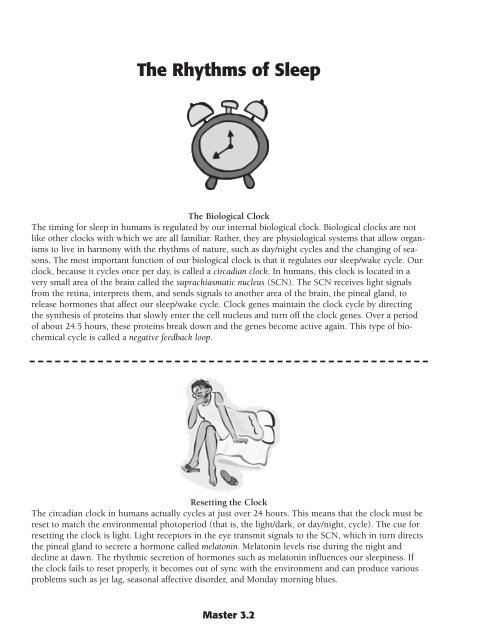Biological - NIH Office of Science Education - National Institutes of ...
Biological - NIH Office of Science Education - National Institutes of ...
Biological - NIH Office of Science Education - National Institutes of ...
You also want an ePaper? Increase the reach of your titles
YUMPU automatically turns print PDFs into web optimized ePapers that Google loves.
The Rhythms <strong>of</strong> Sleep<br />
The <strong>Biological</strong> Clock<br />
The timing for sleep in humans is regulated by our internal biological clock. <strong>Biological</strong> clocks are not<br />
like other clocks with which we are all familiar. Rather, they are physiological systems that allow organisms<br />
to live in harmony with the rhythms <strong>of</strong> nature, such as day/night cycles and the changing <strong>of</strong> seasons.<br />
The most important function <strong>of</strong> our biological clock is that it regulates our sleep/wake cycle. Our<br />
clock, because it cycles once per day, is called a circadian clock. In humans, this clock is located in a<br />
very small area <strong>of</strong> the brain called the suprachiasmatic nucleus (SCN). The SCN receives light signals<br />
from the retina, interprets them, and sends signals to another area <strong>of</strong> the brain, the pineal gland, to<br />
release hormones that affect our sleep/wake cycle. Clock genes maintain the clock cycle by directing<br />
the synthesis <strong>of</strong> proteins that slowly enter the cell nucleus and turn <strong>of</strong>f the clock genes. Over a period<br />
<strong>of</strong> about 24.5 hours, these proteins break down and the genes become active again. This type <strong>of</strong> biochemical<br />
cycle is called a negative feedback loop.<br />
Resetting the Clock<br />
The circadian clock in humans actually cycles at just over 24 hours. This means that the clock must be<br />
reset to match the environmental photoperiod (that is, the light/dark, or day/night, cycle). The cue for<br />
resetting the clock is light. Light receptors in the eye transmit signals to the SCN, which in turn directs<br />
the pineal gland to secrete a hormone called melatonin. Melatonin levels rise during the night and<br />
decline at dawn. The rhythmic secretion <strong>of</strong> hormones such as melatonin influences our sleepiness. If<br />
the clock fails to reset properly, it becomes out <strong>of</strong> sync with the environment and can produce various<br />
problems such as jet lag, seasonal affective disorder, and Monday morning blues.<br />
Master 3.2

















